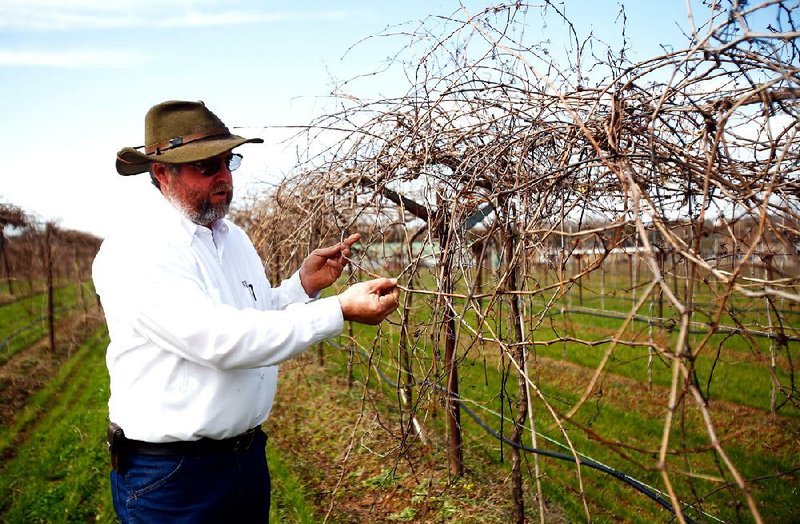LITTLE ROCK — The U.S. Patent and Trademark Office recently issued a patent for a wine grape called Prophecy to Mathew and Thomas Post of the Post Familie Vineyards in Altus.
It’s hoped that the Prophecy grape plant will become a core variety for wine making, said Joseph Post, marketing director of the vineyards and winery. Post’s family is among a handful that settled in Franklin County around the turn of the 19th century.
Prophecy is a hybrid variety that “grows exceedingly well here,” since it’s been created from a plant adapted to Arkansas’ climate and weather patterns, Post said.
Boutique batches of red wine made from the grape since 2008 bode well for the long-term, but Prophecy wine “is still a bird in the bush,” he said referring to market uncertainty.
M. Andrew Walker, a professor and geneticist holding the Louis Martini endowed chair of viticulture at the University of California, Davis campus, said regrettably the wine industry as a whole sees little need for new types of grapes.
Of the more than 5,000 varieties of wine grapes worldwide, the commercial industry uses only 10 to 20 classic types, in part because of the cost of promoting and selling a new wine, Walker said.
It is “hard to compete” against well known varieties such as Cabernet Sauvignon, he added.
Soil and climate conditions throughout most of Arkansas don’t allow for any pure forms of those types of classic wine grapes to be grown.
Cynthiana grapes are most commonly grown in Arkansas.
Altus is considered the unofficial capital of Arkansas viticulture, in part because of its suitable grape growing conditions. The area has been known for wine-making since the 1870s.
Wine industry experts say the Prophecy patent is a type of insurance for exclusive plant sales through the Post Familie Vineyards nursery or any other nursery with which it partners.
The nursery at the Post Familie Vineyards sells the Prophecy plant for about $15 per pot. So far, the plant has been bought by mostly in-state growers.
In Arkansas, about 149 farms grow grapes, according to the 2007 Census of Agriculture. A total of 295 acres of grapes are registered with the U.S. Department of Agriculture’s Farm Service Agency, state Department of Agriculture data show.
Plants also have been sent out of state to see how Prophecy thrives elsewhere. Growers in Virginia and California, which is the country’s leading grape producer and premier wine producer, have received plants, Post said.
In-house grape breeding and patenting at a winery is not common. Still, grape patents are issued regularly.
The Patent and Trademark Office since 1976 has issued 175 patents related to grapes, with 50 related to wine production. Eight of those went to Arkansas.
“It was a lot of work to get the patent,” Post said. “But, in the scheme of doing the breeding and evaluating of the plants, it was a very small amount of time.”
The Prophecy patent application was filed on Dec. 1, 2009, and granted in January.
In technical terms, the hybrid is propagated through a cross between the most commonly used wine-making grape species — Cabernet Sauvignon — and a hand-pollinated cross of the Munson grape.
The Munson is named for Thomas Munson of Denison, Texas. Munson was one the foremost horticulturists of the late 19th century and the renowned author of Foundations of American Grape Culture.
Post said that the Prophecy is a reference to Munson’s prediction that the grape named in his honor, originally known as Jaeger No. 70, would have a profound effect on American wine grape growing.
The Munson grape was developed by Hermann Jaeger of Neosho, Mo., who was credited with saving European vineyards from a destructive plant pest called phylloxera in the 1870s.
Post said his great-grandfather was given one of Jaeger’s Munson grape plants in the 1890s. Post said the plant still grew in the family vineyards in 1994 when John Grinstead, a Missouri grape breeder, advocated the need for a cross between the Munson and native high-quality wine grapes.
The Post Familie patriarch, Mathew Post, designated three acres to help finance experimentation two years later.
Developing a cultivar, or a new named plant, involves crossing plants, numbering seeds, planting those same seeds and culling those without the desirable attribute.
Breeding alone sometimes takes 10 to 20 years. A plant variety receives a name when the selection process is completed.
For wine grape production, the process lasts even longer, since a vine needs another three years before it can bear fruit.
Experts say vineyards take seven years to become mature enough to produce a commercial size crop.
“I think the patent is signaling that this is a new variety that has a tremendous amount of promise,” Joseph Post said.
John Clark, a horticultural professor at the University of Arkansas in Fayetteville and an internationally renowned blackberry breeder, said 12 to 15 years is a reasonable amount of time for a grape to be developed and patented.
The University of Arkansas has helped state growers improve grape production through its patented research since 1964, when a fruit breeding program was started. Breeding efforts have mostly targeted table grape production.
The UA holds patents on several table grapes such as Venus, which was patented in 1977.
Other patented table grapes include Reliance, Mars, Saturn, Neptune and Jupiter.
“The spirit of [the Post’s wine grape patent] is to create a quality wine grape that would make a good product from grapes grown in Arkansas,” Clark said.
Arkansas is home to seven wineries, according to state data.
Al Wiederkehr, owner of Wiederkehr Wine Cellars in Altus, said success of the plant will be determined by the quality of the wine it makes.
“They may have a fine item,” Wiederkehr said, “but [it’s success] is going to depend on how it’s managed.”
And to build demand for a new wine takes a lot of hard work and more time, he said.
Business, Pages 61 on 03/04/2012
